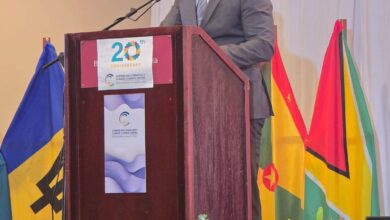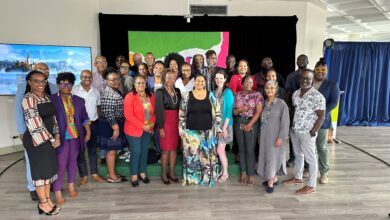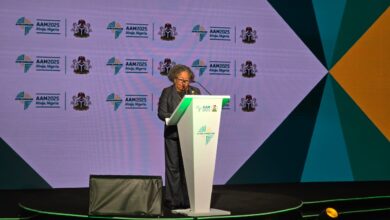Chairman, the Hon Fred Mitchell, Minister of Foreign Affairs of the Commonwealth of the Bahamas
Colleague Ministers of Foreign Affairs of the Caribbean Community
Secretary General of the Caribbean Community
Excellencies
Senior Officials
Distinguished Guests
Ladies and Gentlemen
Let me begin by thanking the Government of the Commonwealth of the Bahamas for their warm hospitality in hosting us for this Eighth Meeting of the COFCOR.
Colleague Ministers, I address you today as the outgoing Chair of the Council for Foreign and Community Relations (COFCOR) of the Caribbean Community (CARICOM), having effectively assumed that role on 22 April 2004, in Barbados.
When we review the course of events in the past year of COFCOR's activities and in international relations, it is clear that conflict resolution, or perhaps irresolution, the challenge for a new interpretation of security and for a reform in international management of security have been, and indeed continue to be, the key foreign policy issues before us and the international community as well.
In the context of conflict resolution, there is no doubt that the crisis in Haiti has dominated the attention and energies of our Council, and indeed of our Heads, and has been one of the most complex and revealing tests of our foreign policy management and of our Caribbean solidarity in our Region's political and integration history.
The deadlocks, strained relations and misunderstandings which developed in the hemisphere as this crisis escalated still persist but they do not characterise the handling of the crisis to the degree that they did in the initial stages of its unfolding. Perhaps, we can say today that we have made progress in the handling of our response to the actions of the various stakeholders in the Haitian crisis. I sincerely believe that this progress has come about through the diplomatic method i.e. through dialogue, sustained contact between all parties, negotiation and mediation. Use of the CARICOM Task Force, established by a decision of our Heads of Government in March 2004, has been an indispensable tool in keeping the channels of communication open and in working towards delivery on our stated commitment to assist the people of Haiti. As Barbados firmly believes and has already stated elsewhere, it is an essential aspect of diplomacy to maintain communication, especially in times of gravest difficulty.
You will recall that at the request of CARICOM Heads of Government, I led a delegation of the COFCOR to Haiti in July 2004 to see first hand the state of affairs in that country and subsequently to advise the Heads on future action to be taken with respect to Haiti and the Interim Administration. We met with representatives of the wide range of stakeholders that are involved in the Haitian crisis. That mission, I think, was an important step in our own process of determining the nature and extent of the crisis for ourselves and to signal CARICOM 's interest in identifying a solution that involved all parties.
For me, it has been very important that the COFCOR's actions have counteracted the concerns or perceptions that the Community was on the periphery of efforts to assist Haiti and worse that the Community did not care for the plight of the Haitian citizen and was ignoring its own neighbours and Member State. We have recognised that as a regional, historical partner of Haiti we have a duty to play a role in international efforts to assist in contributing to its reconstruction, such as the UN Stabilisation Mission (MINUSTAH).
Our exchanges with the UN Special Envoy for Haiti in May last year and the meetings which I had in my capacity as Chair with the Brazilian authorities, in their capacity as leaders of the UN Stabilisation Mission in June 2004, again in November 2004 with the expanded Bureau, and in March this year, and on other occasions, have indeed helped to reaffirm to the international community that CARICOM is fully engaged with this issue and is so engaged as a Regional grouping.
On 12 January this year when I made an intervention in the United Nations Security Council Debate on the situation in Haiti on behalf of CARICOM, I restated CARICOM's commitment to the people of Haiti and mentioned the mechanisms that we had put in place to render technical assistance, particularly where support in electoral matters was concerned. In addition, I noted, on behalf of the Region, that the deep concerns of the regional and international community about the situation in Haiti had increased and I observed, among other things, that the Secretary General's report on MINUSTAH rightly underlined the need for increasing the capacity of the Stabilisation Mission to implement disarmament, demobilisation and reintegration. As the COFCOR's representative, I also spoke of the detention of Lavalas supporters and the importance that we in CARICOM attached to the principles of the Charter of Civil Society.
And it is in this vein of expressing our concerns, reservations and conditionalities while continuing to work through our Task Force and diplomatic channels for progress in election preparations and institution building for the enjoyment of civil and political rights, especially, that I believe that we have made and will continue to make our progress in our response to the dire situation which continues in Haiti.
Regarding the question of security, we acknowledged at our Seventh Meeting in April last year as well at our Retreat in October the centrality of security in the conduct of foreign policy. We recognised that the current discussion on the reform of the Security Council represented an opportunity for us, as small vulnerable actors in the international system, to inform a new definition of security with the realities and threats that we experience on a daily basis which make our lives and our countries insecure.
I am pleased to note here that action was taken on the decision we made at our Seventh meeting to commission a study on new aspects of a foreign and security policy for the CARICOM. Having been able to examine this matter at the Retreat yesterday, which regrettably I was unable to attend due to unavoidable domestic imperatives, I believe that we will have made some headway in organising our ideas, although certain elements regarding the scope of the study must be revisited.
As Barbados has noted elsewhere, the predominant focus on the militaristic, conflict-based aspects of security marginalizes other dimensions of security which are equally or even more important for assuring its attainment.
As developing countries are all too aware of the multidimensional nature of security but are faced with the challenge of changing the terms of the international debate on this subject. The more powerful voices of the developed nations have placed terrorism and other forms of violent transnational crime, the proliferation of nuclear weapons, and war at the top of the list of destabilising elements that make the world insecure Yet, it is the developing world that represents the more populous grouping of the international community and therefore the prevailing notion of security is less than “half the story”, an incomplete picture of what defines our vulnerability everyday. Those of us who are also Ministers of Trade know that security ha s become the most recent non-tariff barrier to trade. So it goes beyond the military aspect.
The Caribbean, in particular, having the highest per capita incidence of HIV/AIDS after sub-Saharan Africa and being a region susceptible to increasingly worse natural disasters each year as we saw last year and early this year, has an unenviable and peculiar sensitivity to non-military elements of security. The International Meeting on the Review of the Barbados Plan of Action that was held in Mauritius in January as well as the World Conference on Disaster Relief in Kobe coming on the heels of the Asian Tsunami Disaster have all provided a momentum for us here in CARICOM to really influence the debate on security and in particular on the matter of the philosophical underpinnings of the basis of membership in the UNSC.
The fact is that the onus is therefore on us to indeed challenge the discourse. We were not independent actors in 1945 and had no say in the creation of the Security Council or in the interpretation of Security. Today we have voice and we have a forum. As we have all recognized, the current debate represents a golden opportunity for the CARICOM to sensitize the international community on the concept of multidimensional nature of security. It is a process which we started in the hemisphere within the OAS at the 32nd General Assembly in 2002. At our COFCOR meeting last year we agreed to consider global security not only in terms of an interpretation which gives salience to terrorism but also from the perspective of vulnerabilities of small states. I am hoping that this perspective will have guided our discussions on the commissioned study.
During the past year we have worked together in this Council to address certain institutional matters internal to the COFCOR, which I earmarked for priority attention when I assumed the role as Chair. You will recall Colleague Ministers that one of the areas on which I had placed emphasis was the need for COFCOR to reassert its role in coordinating the Community's foreign policy. I also expressed my conviction on that occasion that a coordinated policy based on due consultations and the articulation of positions with one voice constitutes the most prudent and healthy approach for small vulnerable countries.
I will now say here and am confident that you will agree that at no time in our history as independent states has it ever been truer that domestic policy and foreign policy are the obverse and reverse of the same coin. I make this point in connection with the matter of coordination. The deepening of the single market process and the establishment of the CCJ in April 2005, which potently symbolises a new phase in our Caribbean identity, reinforce the image of CARICOM as a bloc. Moreover these factors have demonstrated clearly that the necessity and benefits of coordination are proportional to the depth and pace of the integration process.
I believe that when we look back on the most pressing foreign policy situations that we have had to deal with, it becomes clear that having a coordinated position enabled us to move forward together in working with the international community.
The fact that the UN has consistently looked to us for our collaborative support to the work of MINUSTAH, that the President of South Africa will call upon the UN to include us in its initiatives to assist Haiti, as he has done in a statement in this month of May, that various countries continued to seek audiences with us as a group to discuss UNSC reform and candidatures in key Regional and international organisations attests to the fact that, beyond our internal impetus for concerted action, external, 'push ' factors are requiring that we continue to function as one actor on the world stage as far as it is feasible to do so .
Regrettably, however, our programme and timetable have not allowed us to make the kind of progress I would have liked to see in the management of the community relations dimension of our portfolio, although it was addressed at our Retreat. Neither did we manage to arrange a joint meeting of Ministers of Foreign Affairs and of Foreign Trade. The purpose of this you recall is to ensure that our economic and trading objectives are suitably complemented and supported by foreign policy initiatives.
Nevertheless, I am pleased to say that in keeping with the commitment I expressed a year ago, the COFCOR met in retreat in Barbados at Villa Nova in St. John in October 2004. When we review the matters we discussed and the opportunity that we had to ventilate in a structured but informal manner on issues internal to the COFCOR as well as matters of international strategic relevance to our Community, I am sure that you agree that this kind of reflection, brainstorming and troubleshooting is necessary if we are to find creative, enlightened solutions to systemic, complex foreign policy issues.
I am also happy to note that, while we still do not use the Bureau mechanism as often as we could, that we did not give mere lip service to the decisions and commitments that we made at the last COFCOR. It was my intention that the Bureau system should be revitalized to enable the COFCOR to respond to swiftly and effectively to rapidly evolving hemispheric, regional and international issues. Our Bureau met twice in the past year with the second meeting having taken place on March 30 this year when we discussed the matter of UNSC at the request of our Heads of Government.
I am now happy to hand over the responsibility of the Chairmanship of the COFCOR to my Colleague the Hon Fred Mitchell, Minister of Foreign Affairs of the Commonwealth of the Bahamas and we look forward to our future deliberations in the Council under his direction.
Minister Mitchell, we pledge to you our unstinting support in this year that is before us Colleague Ministers, I thank you for your support during my tenure as Chair and equally express my gratitude to the Secretary General of the Community and to all his staff for their guidance and advice over the past year.
This year has not been the easiest in many ways but I do believe that we in the COFCOR have forged a good relationship. Amongst the Organs of the Community in which I have been involved, this Council comes close to the top in the way it does its business. Fred, I believe I am handing over a Council which is in good shape!
I thank you.





